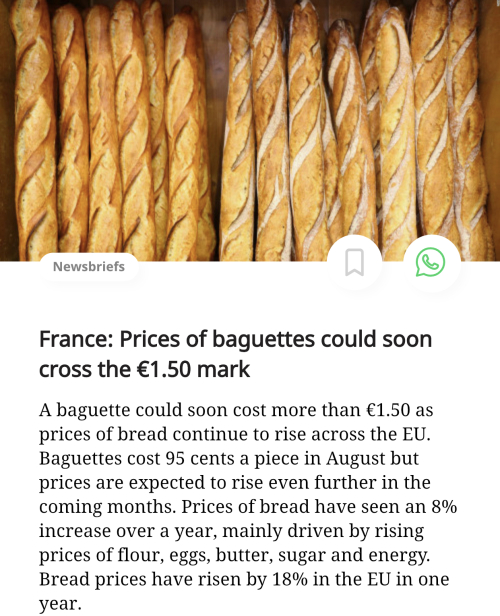In general French people eat baguettes and not sliced bread. A freshly baked baguette is a daily part of life in France. Compared to the States, 1.50 sounds inexpensive.
“The French law states that traditional baguettes must be made on the premises they're sold and can only be made with four ingredients: wheat flour, water, salt, and yeast. They can't be frozen at any stage or contain additives or preservatives, which also means they go stale within 24 hours.
In France, a baker who makes good baguettes pays careful attention to where their flour is made and which grains are used in the milling process. The result is usually softer, heartier, and tastier bread than in other parts of the world. French flour tends to be made with a lower ash content than flour from other countries.
The French slather butter is on the bread only at breakfast. They do not dip their croissant in their cafe au last, nor their chocolat chaud.
“The French just don't do it except at breakfast, and then they slather it on,” says Herrmann Loomis. “But the French don't serve butter with meals, so don't expect any.” And don't put any on your croissant, either. It's made of butter.” via Google.
“The savoring of baguettes is serious business in France – shortages stirred the famous revolution, and there’s even a French bread law. With ten million baguettes sold in France every year, they worship sticks of flour.
Baguettes are everywhere, always.
With 26,000 boulangeries dotted across France, there’s practically one on every corner. So if you’re stuck for ideas on what to eat, you’re sure to be able to grab a baguette (a stick of bread).
Only recently, a boulangerie law, which had been reigning for 225 years, was scrapped in 2015. The law, implemented in 1790, required all boulangeries to report to the authorities when they planned to shut their doors and stop serving bread, even if it was just for a family holiday. The aim was to ensure baguette-hungry locals could always get their eager hands on a slender loaf of fresh bread. A long-term bread shortage was one of the factors that led to the famous 1789 French revolution.“ Via Culture Trip
When the three family-owned bakeries in our town shut their doors without warning, it was like a page straight out of Marcel Pagnol's playbook. The village went into constant chatter! What an upheaval we had to buy our baguettes at the town grocer or the grocery store. What a scandal. Since then, two new bakeries have opened up, and everyone is relieved.


Leave a Reply